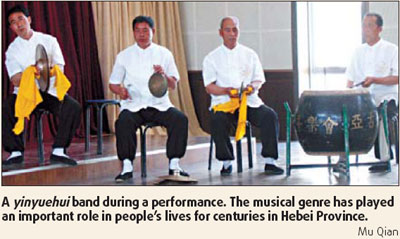When music becomes a religion
Throughout Central Hebei Province in North China, a kind of folk band called Yinyue Hui ("music society") has been playing an important role in the people's lives for centuries. Their music is always an integral part of temple fairs, funerals, and religious ceremonies. Such music, called jizhong shengguanyue or sheng (mouth organ) and guan (pipe) music from central Hebei, was listed as a national intangible cultural heritage last year.
"The listing of jizhong shengguanyue as a national intangible cultural heritage advances people's evaluation of this precious form of music, and helps it to function more in people's lives," said Zhang Boyu, dean of the Musicology Department of Central Conservatory of Music.
Zhang said yinyuehui almost disappeared in the 1980s, but has revived throughout central Hebei Province in recent years.
"As long as folk religions exist, such music will live on," said Zhang, who has been studying jizhong shengguanyue for a long time.
The leading instruments of jizhong shengguanyue are blown instruments sheng, guan, and di (bamboo flute). There are also percussion instruments like gongs, cymbals, and drums. An yinyuehui band usually consists of 12 to 24 musicians.
The music is written down through a traditional Chinese notation system called gongche pu, and all the musicians in an yinyuehui band learn to sing the notation of a tune before playing it with instruments.
The origin of jizhong shengguanyu is still unknown, but scholars believe that it has some relationship with the Buddhist music of the Yuan (1271-1368) and Ming (1368-1644) dynasties.
Yinyuehui bands, from four places, have been included in the list of national intangible cultural heritage: Qujiaying, Gaoluo, Gaoqiao and Shengfang, but many more bands are working hard to achieve the status.
"I don't understand the term 'intangible cultural heritage' very well, but I think if we are listed we will get more attention so that we can carry on our music," said 37-year-old farmer Shi Junping, leader of the yinyuehui band in Yagucheng village of Xiongxian County.
Shi said the band has to depend on itself in raising money to carry out activities, and he hopes that they can be included in the national list so that the government will help them with the budget.
"I feel responsible not to let this music die out, and I'm teaching my daughter to play," said 52-year-old Duo Lanping, the only woman in the Yagucheng Yinyuehui band. "I hope we can get support and travel to different parts of the world to perform this ancient Chinese music."
Traditional yinyuehui bands are made up of men only, but women have been accepted in recent years. "It has to do with the concept of equality between men and women and the fact that more men are leaving the countryside to look for jobs in the cities," said Zhang. "It's a natural process. No one can decide how the band should change."
Having finished a book on his fieldwork of the yinyuehui of the Quantou village in Anxin County, Zhang is planning to carry out a "carpet survey" of all the yinyuehui bands in Hebei Province.
(China Daily 05/23/2007 page18)














